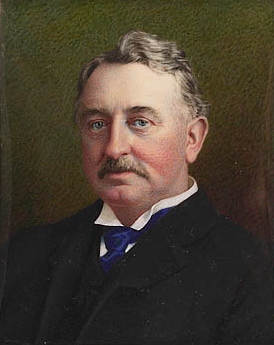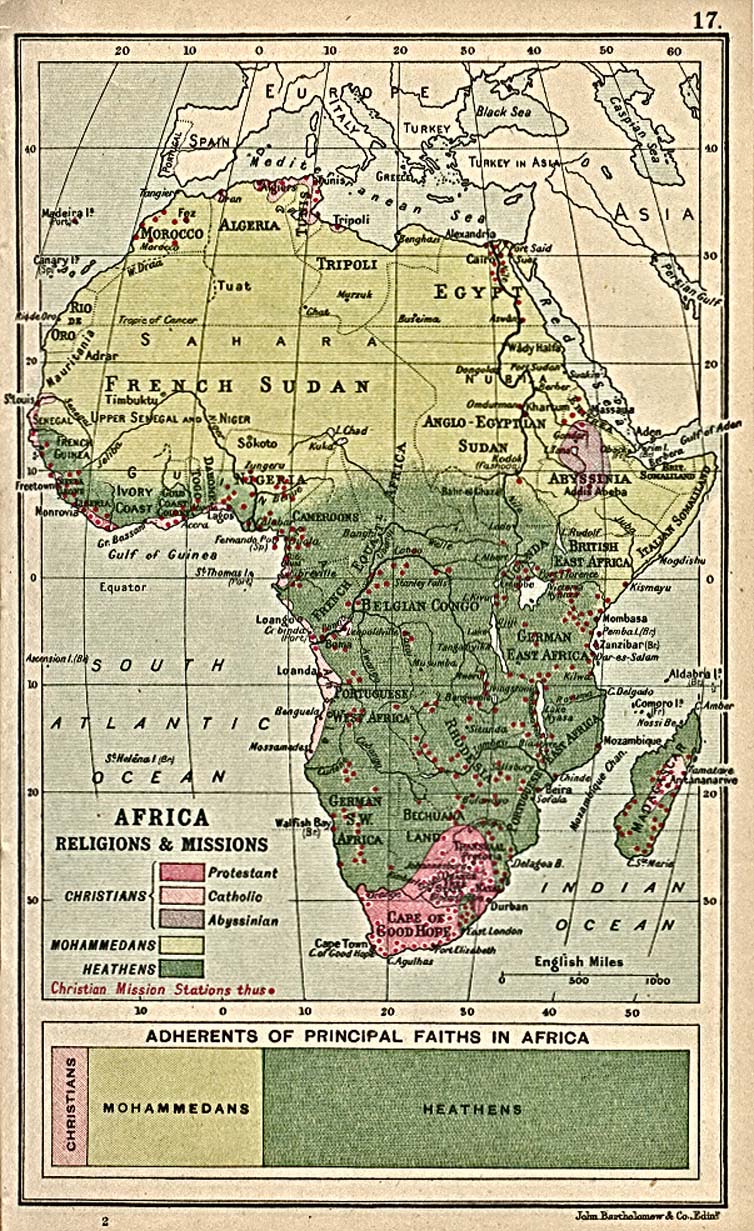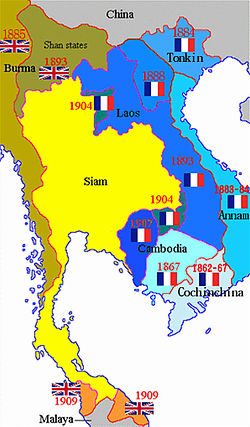
Topics on the Page
Reasons for Imperialism
- Old Imperialism and New Imperialism
-
Desire for economic gain and resources
- Social Darwinism and Imperialism
- Rudyard Kipling & White Man's Burden
-
The emergence of industry within major European Powers
Imperialism in Africa & Middle East
CROSS-LINK: King Leopold, The Congo and Imperialism in Africa
- Missionaries and Colonialism
Brief Overview of Imperialism in Latin America
Overview of Imperialism in Asia
- France and Indochina
- India
Teaching Resources and Chronology of Events in Africa and Asia

 AP World History Key Concept 5.2
AP World History Key Concept 5.2
Focus Question: What were the causes and consequences of 19th century European imperialism?
Reasons for Imperialism
 |
| An Animated Map of the Expansion of Imperialism |
 The Internet Modern History Sourcebook has a section on Imperialism with links to a number of texts.
The Internet Modern History Sourcebook has a section on Imperialism with links to a number of texts.
Imperialism happens when a large, more powerful nation tries to take over a smaller "nation" or region.
Old Imperialism: 1500 - 1800
New Imperialism: 1870 -1914
- In the 19th century, many of the European nations wanted to expand which meant moving away from their own borders and finding more land which no other nation had a "claim" to and take it as their "own."
- During the 19th and early 20th century much of Africa and Asia had come under the colonial rule of a handful of European nations. One of the chief motivations for this European imperialism was economic.
- As European nations underwent rapid industrialization in the 19th century the need for raw materials and new markets grew. Increasingly, as nationalism grew in Europe, building overseas empires was seen as a way to promote national interests and to gain advantages over potential rival nations.
- Some imperialists also believed that spreading European influence was a moral endeavor, a civilizing force. This was especially true of those who sought to spread Christianity.
- Whatever the motivations of this imperial expansion, too often racism became embedded in the ideology of European imperialism, and the reality of building and maintaining an empire was often brutal.
-
- Powerful video highlighting Britain's Empire and Imperialism.
- A webpage which highlights the role of women in Imperialist practices.
- A video lecture on "new imperialism" 1800-1914
Economic Effects
Colonies were primarily used as sources for raw materials used in European and American factories.
- Slaves were also used to increase production, mainly on farms, in the ruling nations.
- The people of the colonies or empires that were not from the "mother" nation had very few if any rights.
- The colonial powers controlled local governments, religions, and even movement of people native to the area.
See John A. Hobson, Imperialism, A Study (1902) for a Marxist economic interpretation of imperial policies.
Social Darwinism and Imperialism
When Charles Darwin published his Origin of Species in the 19th century, his idea of natural selection was morphed into a new social idea known as natural selection.
- This theory states that people, just like plant and animals in Darwin's Origin of Species, compete with each other for survival in an ever on-going game of evolution. In the 19th century, this became a reason for cultures on top of the worlds social hierarchy to be on top and stay on top.
- As such, Social Darwinism became a justification for imperialism.
- Any people under imperialistic rule were considered less than the country controlling them and if they were to be challenged by the peoples under them, it would challenge the status quo of the world order.
Rudyard Kipling, 1895

White Man's Burden
- Kipling's White Man's Burden is a good example of how whites viewed imperialism as a necessary burden to civilize non-white areas. These ideas stemmed from explicit racism. The phrase "the white man's burden" in reference to those non-whites and non-Europeans was wide spread.
- See this, now in-famous soap commercial, as an example of the mainstream usage of these ideas here
 Hear the poem read aloud on YouTube
Hear the poem read aloud on YouTube
Poetry Analysis: The White Man's Burden, History Matters
Imperialism in Africa & Middle East
 |
| Berlin Conference on Africa, 1885 |
The Colonization of Africa, Africana Age, Hunter College
Includes an overview of the Scramble for Africa and African Resistance
African Resistance to Colonial Rule
Interactive map of colonialism Brown University
European Imperialism in Africa, History Tube
The historian Basil Davidson created an amazing documentary series on the history of Africa. The video entitled "The Magnificent African Cake" discusses how European imperialism on the continent divided it up into unorganized countries.
This article in The Guardian (Nov 2012), describes the effects of colonialism on Africa today and the importance of understanding imperialism outside of Western Eyes.
The 19th century saw a wholesale divvying-up of Africa among European nations, primarily by England, France, Belgium and Portugal.
- European powers took their struggles for power and prestige to the African continent and competed with each other for dominance there.
- After a lot of tug-of-war over land, the Berlin Conference (1884-1885) made national divisions official (for the Europeans, at any rate). European control over African land meant European control and ownership of African resources, such as ivory, rubber, hemp, and other materials essential to the perpetuation of European industry.
- Many African nations did not see self-rule and independence until the 1960s and 1970s, and many did not achieve independence until the 1980s and 1990s.
By 1913 dozens of African nations were under the control of a short number of European powers.
- Notice that many of these nations do not have the names they have now.
- Anglo-Egyptian Sudan’s governance was influenced by England, as was Zanzibar’s and Egypt’s.
- Only Liberia in the west and the Empire of Ethiopia in the east were completely independent states in 1913. Ethiopia was later colonized by Italy.
Cecil Rhodes
Cecil Rhodes, 1902

Cecil Rhodes colonized a majority of Africa in his "Cape to Cairo" mission
-
- His character is judged in this BBC historical article.
Cecil Rhodes from South African History Online
England
|
France
|
Germany
|
Spain
|
Italy
|
Portugal
|
Belgium
|
Union of South Africa
Niger
North Rhodesia
South Rhodesia
Gold Coast
Uganda
British Somaliland
Gambia
British East Africa
Swaziland
Basutoland
Sierra Leone
Bechuanaland Protectorate
|
Algeria
French Morocco
Senegal
Nigeria
Cote d’Ivoire
French Equatorial Africa
Gabon
Tunisia
Madagascar
French Somaliland
|
South West Africa
Kamerun
Togoland
German East Africa.....
|
Rio de Oro.
Ifni
Tangier
Rio Muni
|
Libya
Italian Somaliland.....
Eritrea
|
Angola
Mozambique
Cabinda
|
Congo Free State
|
Source: Historical Atlas of Africa; Cambridge U. Press; 1985.
This 1913 map shows the regions mentioned below, focusing on the religions of the people there for missionaries intending to convert Africans to Christianity

For many places that became European colonies, religion became both a motivation and an excuse for further colonization.
- Many Protestant missionary societies were formed in the European nations. Missionaries themselves wanted to "save" local people who were not Christians. This stemmed from the Christian doctrine of The Great Commission found in the book of Matthew, where Christ commands his followers to bring his message to the ends of the earth. Missionaries felt morally bound to do so.
- Colonial governments were only too happy to have naive idealistic missionaries come in to a region to subdue the locals and give the colonial governments an acceptable reason to be in the country, taking its natural resources.
- The catalyst for most of the missionary zeal in the 18th century was of Protestant origin. Protestants had traditionally lagged behind the Catholics in their zeal for converts. Catholic missionaries had been active since the earliest days of the church. Now there was a renewed competition for souls.
A brief overview of Imperialism in Latin America
- A link to a webpage which contains a brief overview of the main themes of Latin American imperialism
- A lesson plan on curriculum dealing with slave revolts in Latin American colonial states.
- An article on the importance of teaching Latin American history in the context of world history.
- A webpage which has compiled primary resources and other more general resources on Latin American history.
Overview of Imperialism in the Asia - Pacific Region
 Stamford Raffles arrives in Singapore 1819
Stamford Raffles arrives in Singapore 1819
- British attack Lower Burma 1826
- Maori War ends with the Treaty of Waitangi 1840
- British railroads open in India 1853
- Sepoy Rebellion 1857
- French attack Vietnam 1858
- Indian National Congress established 1885
- UK/France agree to neutralize Thailand 1896
- Com. Dewey defeats Spanish at Manila Bay (Philippines) 1898
- Dominion of Australia established 1901
- Dominion of New Zealand established 1907
Use this link for an interactive video that discusses European imperialism in Africa.
Asia - Pacific:
The acquisition of territory in the Asia-Pacific region by the European powers began, as in Africa, with the establishment of trading posts along the coasts of South Asia, Southeast Asia and China during the 16th, 17th and 18th centuries. The royal charter granted to the East India Company by Queen Elizabeth I in 1600 established the pattern of trade expansion that, eventually, led to the expansion of territorial control.
 |
| Inauguration of tramway from Saigon to Cholon, 1881 |
France and Indochina

The French in Indochina, from Digital History
French Indochina, 1885-1954: Colonialism, Nationalism and War
Prezi Presentation on French Imperialism in Vietnam
Go here for a brief history of Vietnam
Ho Chi Minh and the Vietnam War, Society for Historians of American Foreign Relations
India
 The Story of India, the website offers a wealth of resources on Indian history.
The Story of India, the website offers a wealth of resources on Indian history.
In the first half of the 18th century, the British were a trading presence at certain points along the coast of India; from the 1750s they began to wage war on land in eastern and south-eastern India.
- By the end of the century British rule had been consolidated over the first conquests and it was being extended up the Ganges valley to Delhi and over most of the peninsula of southern India.
- By then the British had established a military dominance that would enable them in the next fifty years to subdue all the remaining India states of any consequence, either conquering them or forcing their rulers to become subordinate allies.
- Basically, the British started their grip in India with a trading presence, and over time waged war until that dominated India.
Looking at the East India Company, it had a monopoly of all English trade to Asia by royal grant at its foundation in 1600. It grew to a huge size. Towards the end of the 17th century India became the focal point of the company's trade. Cotton cloth woven by Indian weavers was being imported into Britain in huge quantities to supply a worldwide demand for cheap, washable, lightweight fabrics for dresses and furnishings. [1]
The example of India and Britain is a perfect example of European Imperialism. Britain wanted India for economic reasons. India provided lots of natural resources that Britain wanted. Because of these benefits Britain acted in an imperialistic way, "claiming" India or taking it as its own.
Response to British Imperialism and Colonialism in 19th century India
- The Sepoy Rebellion was a revolt of soldiers, employed by the British East India Company, against the Company
- The Indian soldiers in the BEIC were known as "Sepoys". Although they revolted for a variety of reasons against the British
- Although the Sepoys outnumbered the British in the BEIC 2-1, all positions of power in the Company were held by the British
- one event known as a spark for the incident is one where Indian soldiers began to believe that the lubricant in the powder cartridges for the new British Enfield rifles (that needed to be ripped off with the teeth) was made out of either pig or cow fat, animals forbidden to be consumed by Muslims and Hindus respectively. This enraged the Sepoys who were in majority Muslim and Hindu by faith and felt disrespected by the British. view Indian Soldiers for the British East India Company ; view depiction of Sepoy Rebellion
- At first, the sepoys successfully took control of a number of Indian cities including Delhi, as well as executed many of their British superior officers
- however, the sepoys lacked an organizational structure or a clear leader. Further, they lacked widespread support since those who did well under the British tended to support colonial rule
- The British soon arrived with reinforcements, regaining territory lost. This led to an increased British role in the country as well the British Government officially taking control from BEIC, strengthening the holds of British Imperialism over the oppressed Indians
 British Colonialism in India101.pdf
British Colonialism in India101.pdf
Th
http://www.pbs.org/thestoryofindia/teachers/lessons/6/ A lesson plan on British attitudes towards India, based on the PBS documentary
Teaching Resources
This unit plan offers numerous materials for teachers to utilize while teaching about imperialism. It offers lecture information, maps, political cartoons, primary source documents, work sheets, classroom activities, and much more!
Women in World History provides an overview of the role of women during 19th century imperialism. This site also provides lesson plans, primary documents, and possible essay questions.
This piece offers a really provocative look at the association between European imperialism and gender roles, linking the submissive role of women to that of colonized nations. It also looks into eugenics, power structures, and hegemony at the time, providing an incredibly unique perspective on the events of imperialism.
The Story of Africa: Africa and Europe (1800-1914), includes links to episodes of the BBC radio documentary, as well as a lot of information on the history of Africa.
The New Zealand Wars
Treaty of Waitangi, the web site includes both English and Maori text of the treaty, along with teaching resources about the Maori War.
Chronology of Events in Africa
- Dutch abolish slave trade in Africa 1795
- Napoleonic Invasion of Egypt 1798
- UK declares end to Slave Trade 1808
- Boer's Great Trek 1830's
- French Seize Algeria 1830
- England abolishes slavery 1833
- Sultan of Oman makes capital in Zanzibar 1840
- Dr. Livingstone arrives in Africa 1841
- Crimean War ends in Russian defeat 1856
- US abolishes Slavery 1863
- Suez Canal Done 1869
- Zanzibar Slave Trade Ends 1873
- UK sets up Gold Coast 1874
- UK informally protects Egypt 1881
- Pierre de Brazza signs treaty establishing French ("Brazzaville") Congo 1882
- Berlin Conference on Africa 1884
- Gen. Charles Gordon killed by Mahdist forces 1885
- Brazil ends slavery 1888
- British/French Fashoda crisis 1896
- Gen. Herbert H. Kitchener defeats Mahdist forces at Omdurman 1898.
- Boer War 1899-1902
- All-India Muslim League founded 1906
- Congo Free State given over to Belgian government 1908
- Union of South Africa established 1910
(from Essential World History, Duiker & Spievogel 2001)
Chronology of Events in Asia
Year
|
Event
|
1600
|
Founding of The East India Company. The Royal Charter of the Company was approved by Elizabeth I
|
1644
|
Manchurian Qing Dynasty established in China
|
1680
|
Recreational Opium/Tobacco mix first introduced to China by the Dutch
|
1720
|
British Parliament bans Asian textile Imports to increase domestic production
|
1720-1839
|
Chinese Tea as one of the primary Commodities in the British market
|
1729
|
First government prohibition on the distribution of Opium in China (Not heavily Enforced)
|
1760
|
British began to use Opium as a Cash Crop for both Chinese commodities and silver
|
1773
|
1000 Chests of Opium imported into China.
|
1813
|
Increased Opium addicts in the Chinese bureaucracy causes concern in the Qing Courts
|
1815
|
End of the Napoleonic Wars, Britain consolidates imperial power in Asia and Africa
|
1832
|
20,000 Chests of Opium Imported into China
|
1836
|
Qing Court formally prohibits all imports of Opium and attempts to close the ports of Canton and Shanghai
|
1839
|
Commissioner Lin Zexu openly burned 1.2 million kilograms of confiscated opium
|
1839-1842
|
First Opium War: Qing Empire Vs. Britain and its allies in France, United States, and Russia
|
1842
|
Treaty of Nanjing opened the ports of Canton and Shanghai. Hong Kong became a British colony
|
1856
|
Chinese seizure of British Vessel “The Arrow” in suspect of piracy
|
1858
|
Tientsin Treaties, negotiations between Chinese, British, French and American diplomats
|
1859
|
British and French diplomats were refused entry into Beijing
|
1860-1862
|
Second Opium War, Looting of the Qing Imperial palace in Beijing
|
1898-1901
|
Chinese anti-Foreign uprising, Boxer Rebellion
|
1900
|
John Hay’s “Open Door Policy” calls for equal trade rights amongst Europeans in China
|
1912
|
Official collapse of the Qing Empire and establishment of the Republic of China
|
1912
|
London Missionary Society establishes Hong Kong College of Medicine, which later became the University of Hong Kong. First western institute of higher education in Hong Kong
|
1997
|
Hong Kong returns as territory of the People’s Republic of China
|
Sources:
Hochschild, Adam; King Leopold’s Ghost: A Story of Greed, Terror, and Heroism in Colonial Africa; Houghton Mifflin, New York; 1998.
[1] Marhsall, Peter; The British Presence in India in the 18th Century. BBC History. February 17, 2011. http://www.bbc.co.uk/history/british/empire_seapower/east_india_01.shtml.
New Imperial
Essential World History- Duiker 2001( see chart of other info pp511-20 and 527-29)
TEA TRADE. Retrieved March 1, 2007, Web site: http://en.wikipedia.org/wiki/British_East_India_Company
Comments (0)
You don't have permission to comment on this page.